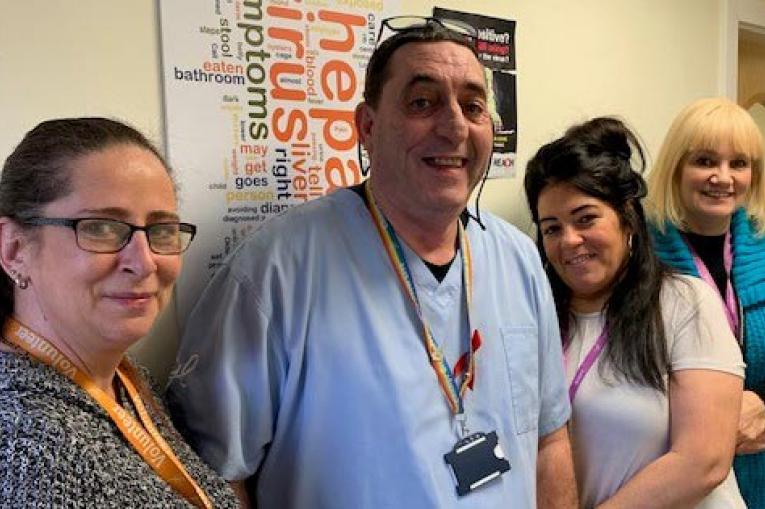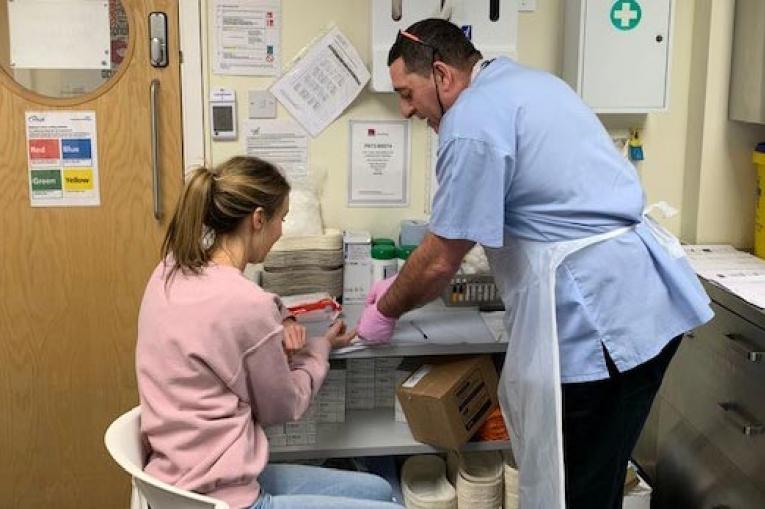26 February 2020
By Johnathan Occleshaw
Johnathan Occleshaw is our Hepatitis C Coordinator for the North West region. Here he explains how the Integrated Recovery Service in Halton micro-eliminated hepatitis C.
What is micro-elimination?
Hepatitis C is one of the most common blood-borne viruses in the country. Testing and treatments have improved a lot over the years, and most people with the virus can be cured with few or no side effects.
Micro-elimination is a new way of tackling hepatitis C in local areas. It uses a series of targets to make sure that people are being diagnosed and getting the treatment they need quickly and easily.
When we say an area has micro-eliminated hepatitis C, that means it has reached these targets:
- 100% of people using the service have been offered a hepatitis C test.
- 90% of these people have then been tested.
- 75% of people who were diagnosed with hepatitis C have started treatment.
NHS England set these micro-elimination targets, in order to eliminate hepatitis C as a major health concern by 2025. We’ve been working with Gilead Sciences to reach the targets in Change Grow Live services all over the country. Thanks to a lot of hard work from the whole team, our Halton service has become the second Change Grow Live service to micro-eliminate hepatitis C.
How we launched micro-elimination
The first step was to make sure all our records were correct and up to date. We needed to know how many people we would be offering a test, and who they were, so that we could streamline the process and get the right people into treatment.
Next, we made sure the whole team was involved from the very start. Together with Charlotte Roberts, the service manager, we spoke with everyone at every level to make sure they knew what we were doing, and what their part was. Taking a whole-team approach from early on really helped to make things more streamlined and efficient.
There was no hepatitis clinic at the service, but we knew that sending people elsewhere to get tested would be extremely difficult to organise, and take up lots of valuable time. Instead, we met with the Operational Delivery Network (ODN) for our area. ODNs are the regional bodies NHS England is using to support hepatitis treatment around the country. We spoke to them about organising a clinic at the service, so that people could begin treatment without needing to visit a hospital.
We partnered with the Royal Liverpool University Hospital to run a clinic on-site once a month. Originally, this was just going to last for two to three months, but once we hit the micro-elimination targets we extended them even further. Hopefully, in the next few months the Halton service will hit a milestone of 100% of people diagnosed with hepatitis C getting tested and entering treatment.

I'm so proud of our team - we know how important supporting people into hep C treatment can be. It’s been amazing to see people attend for treatment and see the positive impact it has had on them and their families!
Charlotte Roberts - service manager at the Integrated Recovery Service in Halton.
Overcoming our biggest challenge
The biggest challenge was making sure everyone was able to get treated. We only had one day a month, so how could we make sure they would show up on the day?
From previous experience we knew that people often missed clinics, for many reasons. In Morecambe, we used a system where we arranged lifts and a shuttle service to actually pick people up and give them a lift to the clinic.
This worked well, so we decided to use the same approach. We arranged to go out and visit people on the day, encouraging them to attend the clinic and giving them lifts to the site. Once again, the whole-team approach was so important. We couldn’t have made it work without having buy-in from everyone from the very start.
What we learned
To any service working towards micro-elimination, my advice would be get everyone around the table at the very beginning. Make sure everyone knows what their part is, and when they need to do it.
Sitting down with everyone at the start to iron out a whole-team approach made things a heck of a lot easier in the long run. People didn’t have to come in to loads of separate little appointments. Instead, they came in for a day, would have an ultrasound scan of their liver, a nurse from the Royal Liverpool would do the blood testing, and by the next month anyone who needed it would be in treatment. Because the clinics are now running regularly, we can make sure that every team is free when they need to be, so we can plan ahead and make sure each month’s clinic is a success.
To anyone using one of our services, or considering getting tested, I would thoroughly recommend it. It’s quick and easy, and we’ll do everything we can to help you get the treatment you need.
Get in touch
If you’re interested in sharing learnings about hepatitis micro-elimination, or would like to find out more, feel free to email me at [email protected].

Get tested
If you would like a free, quick test for hep C, speak to someone from the team at your service, and they’ll be happy to help.
Find out about hepatitis and how to get tested
